
The notion that vegans and the lactose intolerant cannot get their recommended amount of daily calcium is a myth, says the Produce for Better Health Foundation. Although calcium is closely linked to milk and milk products such as cheese and yogurt, plant-based foods are also calcium-rich. Fortified soy milk gives you just as much calcium as cow's milk–and it's also a great source of vitamin D and protein.
Benefits of Calcium
Video of the Day
Your body contains more calcium than any other mineral, according to the National Institutes of Health, with 99 percent of it in your bones and teeth. Calcium is also necessary for blood clotting and well-functioning heart, muscles and nerves. Growing children and teens need more calcium than adults; older women also require higher amounts of calcium. The National Osteoporosis Foundation states that adult men and women under 50 need 1,000 milligrams calcium each day. Those 50 and older need 1,200 milligrams.
Video of the Day
Soy Milk and Calcium
The Soyfoods Association of North America claims that soy milk gives cow's milk a run for its money on the nutrition front. An 8 pimce serving of fortified soy milk gives you 30 percent of your daily value. If you don't consume cow's milk for health reasons, such as lactose intolerance or allergies, or because it doesn't fit into a vegan diet, soy milk is your best alternative, according to the 2010 Dietary Guidelines Advisory Committee.
Cow's Milk Comparison
A cup of whole cow's milk also gives you 30 percent of your daily value for calcium. However, milk is higher in calories, total fats–including saturated fats–and sugars. A cup of whole milk contains 149 calories and 8 grams total fat, 5 of which are saturated, and 12 grams sugar. The same serving of soy milk contains 109 calories and 5 grams total fat, 0.5 of which are saturated, and 6 grams sugars.
Other Soy Milk Benefits
A serving of fortified soy milk is also a valuable source of vitamin D, giving you 30 percent of your DV–the same as a cup of whole milk, according to Soyfoods Association of North America data. Soy milk and other soy foods are also an excellent source of protein if you're on a dairy-restricted diet. A cup of soy milk contains 7 grams of protein, only slightly less than whole or reduced fat milk, which contains 8 grams.
Other Tips
Getting some of your calcium from soy milk and other mineral-rich foods may be a healthy decision, says the Harvard School of Public Health. Dairy foods high in calcium can lower your chances for osteoporosis; however, if you consume too much, this may increase your risk for prostate or ovarian cancer. Additionally, the vitamin A present in dairy products can also exert the opposite effect on your bones, making them weaker. The school recommends eating a wide variety of calcium-rich, nondairy foods–not just fortified soy milk, but green leafy vegetables like bok choy and collard greens and baked beans.